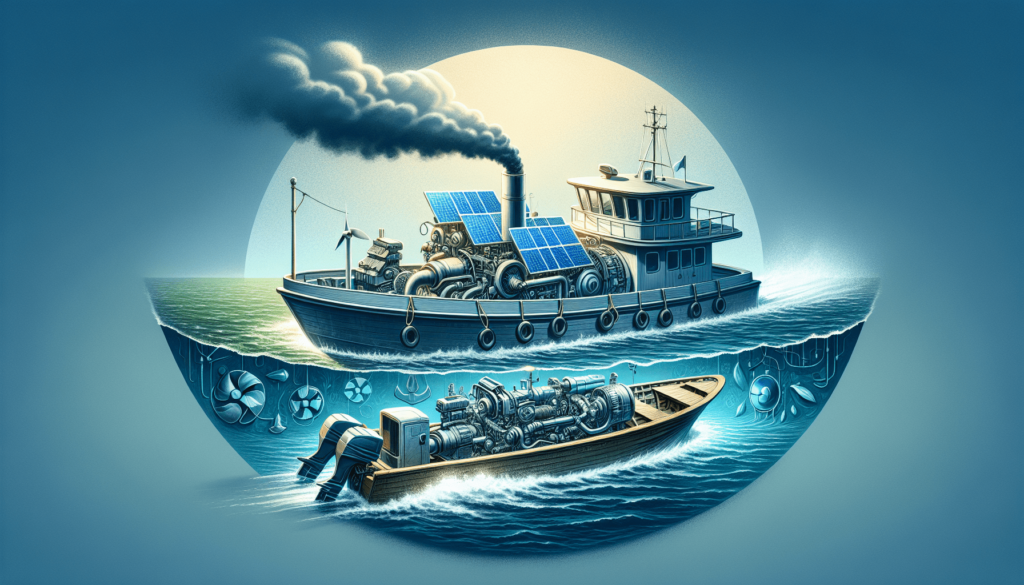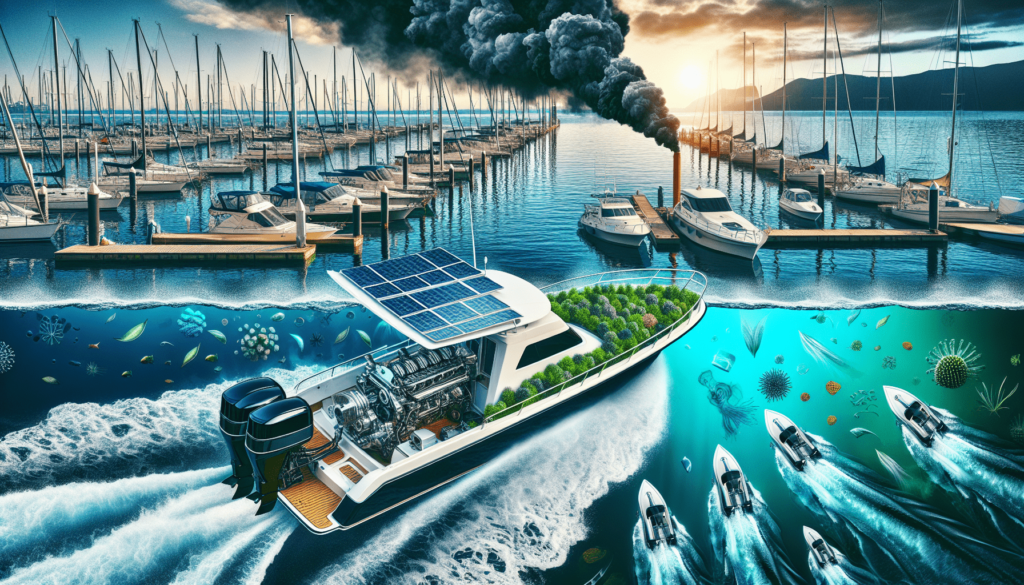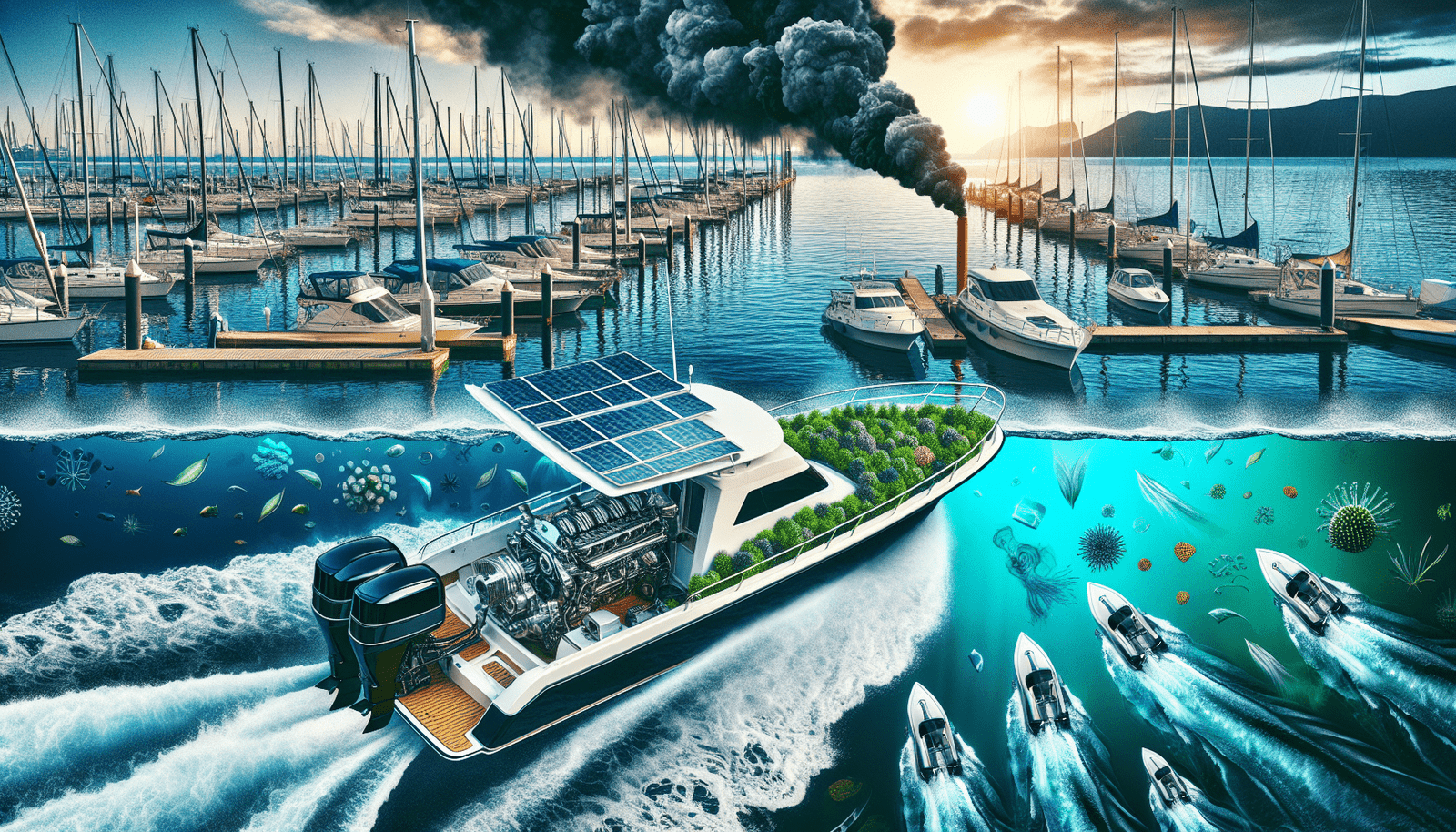Ever thought about how much pollution boat engines contribute to our water bodies and air? If not, it’s time we started this conversation. This article takes you through the insightful world of innovative and smart solutions being implemented to combat boat engine pollution. As the guardian of your environment, you’ll discover how automatic shut-off systems, fuel-efficient technologies, and eco-friendly propellers are playing a pivotal role in preserving the health of our oceans and atmosphere. All in hopes that your next leisurely boat ride or fishing expedition is guilt-free and greener. Techniques to reduce boat pollution are oft overlooked, yet they have the potential to create a significant impact on our ecosystems. Get ready to navigate the waters of knowledge in this enlightening read.
The Effects of Boat Engine Pollution
Boat engine pollution can affect not only the environment but also the health of humans. Now more than ever, there’s a need for us to understand its impacts, especially as the number of boats worldwide increases.
Damaging Impact on Marine Life
You might not immediately see it, but boat engine pollution has a harsh impact on marine life. Engine oils and fuel that accidentally spill into the water can create a film, blocking sunlight and affecting photosynthesis, which is crucial for sea plants and the animals that feed on them. The noise pollution generated by boat engines can also interfere with marine life’s behavior, including reproduction, feeding and migration.
Health Risks for Humans
From a human standpoint, boat engine pollution poses health risks as well. The gases emitted by boat engines can contaminate the air we breathe. Long-term exposure could lead to respiratory issues and other health complications. Moreover, if you regularly engage in water sports, you are more likely to come into direct contact with polluted water caused by boat engine waste.
Emission of Greenhouse Gases
Boat engine pollution is a significant contributor to greenhouse gas emissions. These gases trap heat in the earth’s atmosphere, thereby contributing to the planet’s overall climate change. As boating activity increases, so does the emission of these harmful gases.
Current Standards for Boat Engine Emissions
Various regulations have been imposed by several organizations to control boat engine emissions. These standards are crucial in maintaining our ecosystems and ensuring our safety.
International Maritime Organization Regulations
The International Maritime Organization (IMO) has several marine pollution regulations in place. They advocate for cleaner, more efficient engines, with limits on sulfur and nitrogen oxide emissions.
Environmental Protection Agency Guidelines
The Environmental Protection Agency (EPA) also enforces regulations on harmful pollutants from boat engines. They set guidelines on the emission of carbon monoxide, nitrogen oxides, and hydrocarbons.
Challenges in Compliance and Enforcement
Enforcing these regulations is a challenge due to the vast and international nature of water bodies. Tracking boat activity and emissions across the world is a challenging feat, and not all regions have the resources for effective enforcement. Furthermore, compliance can be costly for boat owners, providing a disincentive to adhere to these standards.

Advancements in Fuel Efficiency
As awareness about boat engine pollution increases, advancements in fuel efficiency have been made. These developments aim to decrease both pollution and costs.
Improvements in Engine Design
Advancements in engine design have contributed greatly to fuel efficiency. Newer models now use highly efficient fuel injection systems, with advanced combustion chamber designs that reduce fuel consumption and emissions.
Use of Alternative Fuels
The use of alternative fuels, such as biofuels and hydrogen fuel cells, offers another opportunity for reducing pollution. These fuels not only emit fewer pollutants but also maximize energy use.
Energy Management Systems
Energy management systems help optimize the use of fuel in a boat engine. By monitoring fuel consumption and optimizing engine operation, these systems can substantially reduce emissions without sacrificing engine performance.
Adoption of Electronic and Hybrid Propulsion
Electronic and hybrid propulsion systems have also entered the boating scene. Although some challenges exist, they offer promising solutions to boat engine pollution.
Benefits of Electric Engines
Electric engines produce zero emissions during operation, making them a superb alternative to traditional gasoline or diesel engines.
Hybrid Systems: Combining the Best of Both Worlds
Hybrid systems offer the reliability of traditional engines with the low-emission benefit of electric engines. They also provide more flexibility, allowing you to switch between power sources as needed.
Challenges in the Widespread Adoption of Electronic and Hybrid Propulsion
Despite their benefits, these propulsion systems face challenges in widespread adoption. High costs, limited range, and a lack of charging infrastructure are some issues. However, these challenges provide opportunities for innovation and development.

Innovations in Boat Design
Boat design innovations are also making their own contributions. By making boats more energy-efficient, we can reduce fuel consumption and consequently, emissions.
Energy-Efficient Hull Designs
Hull design plays a significant role in a boat’s energy efficiency. More streamlined designs decrease water resistance, reducing the power needed and the fuel consumed.
Use of Lightweight Materials
Incorporating lightweight materials in boat construction also helps in reducing energy consumption. By reducing the weight of the boat, less power is needed to move it, directly decreasing fuel consumption.
Optimized Propeller and Rudder Systems
Optimized propeller and rudder systems contribute to fuel efficiency as well. By optimizing the hydrodynamic efficiency, these can help decrease fuel consumption and lower emissions.
Exhaust Gas Treatment Systems
Exhaust gas treatment systems offer another means to combat boat pollution.
Understanding Selective Catalytic Reduction
Selective Catalytic Reduction (SCR) is a technique that injects a liquid-reductant agent into the exhaust stream of a diesel engine. This chemical reaction can significantly reduce nitrogen oxide emissions.
Applying Exhaust Gas Recirculation
Exhaust Gas Recirculation (EGR) also reduces emissions by rerouting a portion of an engine’s exhaust back into the engine cylinders. This process can help lower nitrogen oxide emissions, improving air quality.
Utilizing Scrubber Systems
Scrubber systems help to reduce sulfur oxides from ship engines. They clean the exhaust gas by spraying it with alkaline water, which can effectively mitigate the harmful effects of sulfur oxides.
Use of Renewable Energy Sources
Renewable energy provides a sustainable solution for reducing boat engine pollution. The extraction, production, and use of these energy sources generate minimal emissions compared to conventional fuels.
Solar-Powered Boats
Solar-powered boats utilize the energy from the sun to power their engines. With the right equipment and conditions, solar power can provide a clean and efficient means of propulsion.
Harnessing Wind Energy
By using wind turbines, boats can generate electricity without emitting harmful pollutants. The wind’s power has been an essential force in sailing for centuries, and today’s modern sailboats capitalize on this unlimited energy source.
Potential of Wave Energy for Propulsion
Wave energy could potentially serve as another clean source of propulsion. By converting the energy from waves into mechanical power, it can offer a renewable source of electricity.
Software and Technology Solutions
Software and technology solutions offer an innovative means to reduce boat engine pollution.
Data Analytics for Efficient Navigation
Data analytics can optimize navigation routes, leading to less fuel consumption. Real-time data on weather, currents, and waves can help in choosing the most efficient course, saving fuel, and reducing pollution.
Monitoring and Control Systems
Monitoring and control systems ensure optimal function of the engine and devices. By constantly checking the performance of various components, maintenance needs can be addressed promptly, resulting in reduced pollution.
Artificial Intelligence in Vessel Operations
Artificial Intelligence can be used in facilitating vessel operations. By using machine learning algorithms, AI can optimize routes, streamline operations, and enhance fuel efficiency, ultimately reducing emissions.
Government Policies and Incentives
Government policies and incentives play a crucial role in promoting eco-friendly boating practices.
Promoting Sustainable Shipping Practices
Government bodies worldwide are promoting sustainable shipping practices. By enforcing strict regulations and standards, they encourage the boating industry to move toward greener practices.
Subsidies for Green Technology Adoption
Several governments offer subsidies for green technology adoption. By offering economic incentives, they encourage the use of cleaner, more efficient technologies in the boating industry.
Enforcement and Implementation of Regulations
Government bodies also enforce adherence to standards and regulations. Strict implementation promotes compliance and encourages responsible boating practices.
Future of Eco-Friendly Boating
The future for eco-friendly boating looks promising. With emerging technologies and concepts, we can look forward to a more sustainable boating industry.
Emerging Technologies and Concepts
As technology evolves, so too does our potential for cleaner boating. Emerging concepts in energy storage and innovative propulsion systems can drive the industry toward more sustainable practices.
Potential Impact of Autonomous Boating
Autonomous boating also has the potential to shape the future of eco-friendly boating. Through optimal route planning and efficient operations, autonomous vessels can significantly reduce fuel consumption and emissions.
Challenges and Opportunities in Creating a Sustainable Boating Industry
Creating a sustainable boating industry presents both challenges and opportunities. Although costs and technical hurdles may be daunting, the benefits to the environment and human health are undeniable. The collective effort of governments, boat owners, researchers, and the public is necessary to move toward a sustainable boating future.

